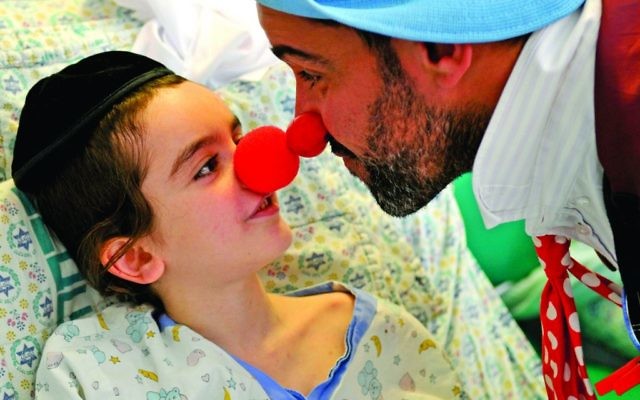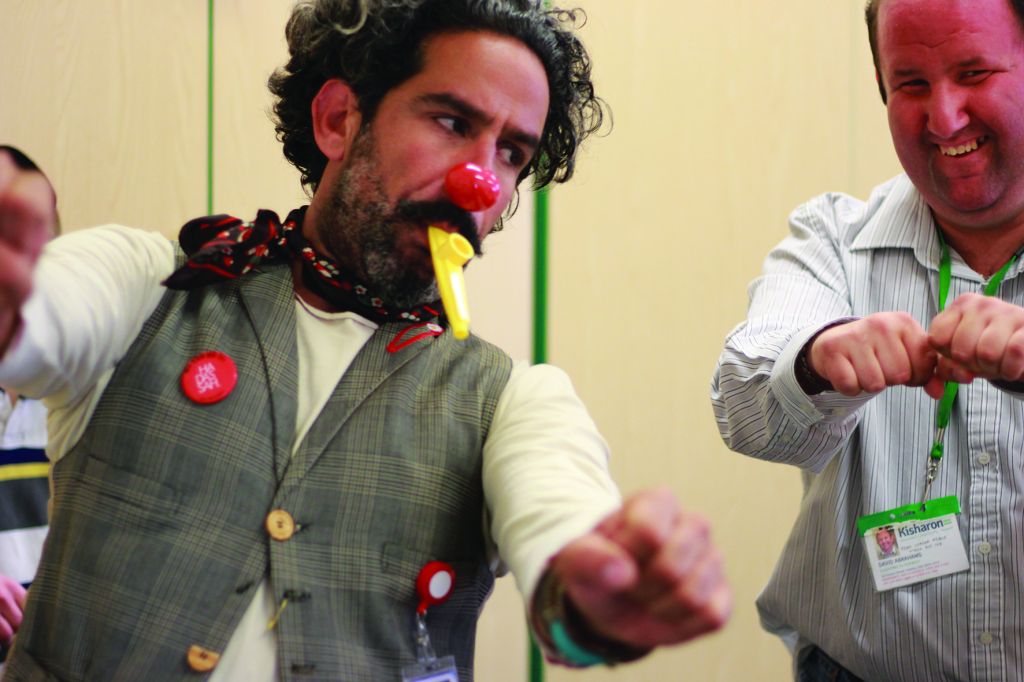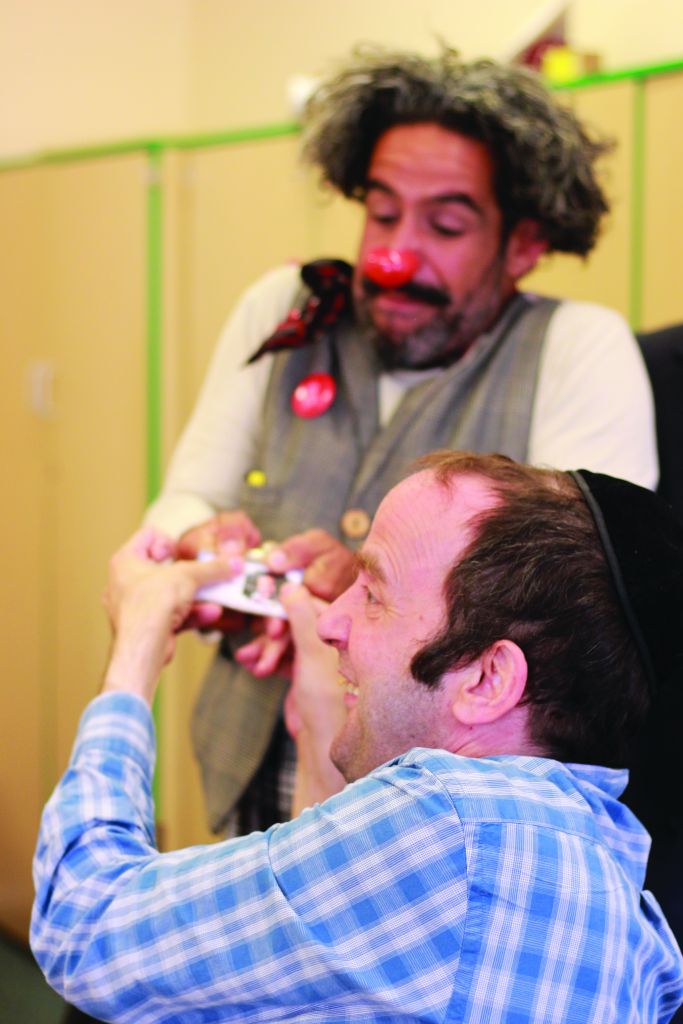Laughter’s the best medicine
Meet Dush, who works at Israeli hospitals putting smiles on children’s faces as a medical clown
Caron Kemp is a freelance journalist

phHe gently turned the handle of the old-fashioned minute music box, producing a calming, beautiful sound that filled the space between himself and the young man cowering in the opposite corner.
As all else was silent and the melody continued its slow, steady rhythm, the fear and uncertainty gently washed away.
Encouraged by the simple yet sincere gesture, this young man – who struggles every day to interact with other people – looked up and met Dush’s glance.
In that brief moment, years of barriers were undone.
For David Barashi, whose stage name Dush is a nod to his father’s Kurdish roots, this connection was no accident. He has been perfecting his skills for 25 years and for the past 13 has been working at Hadassah Hebrew University Hospital, Ein Kerem, Jerusalem, as a medical clown.
So when he was invited to Kisharon Adult Day Centre in Hendon to meet people with learning disabilities and complex special needs, he knew not only what their challenges were, but exactly how to build trust and to offer something profoundly positive to their day.

Calling Dush a clown feels like a disservice. Aside from the lack of face paint and garish costume, he is a trained specialist in medical therapy and an integrated facet of the Israeli healthcare system; working as part of multidisciplinary teams in various units including paediatrics and sexual abuse clinics. He is also part of the IDF Israeli emergency team sent around the globe to help in natural disasters such as Haiti and Nepal.
“I deal with the person as a whole,” explains Dush, who was touring the country for a week to educate people on what is still a medical phenomenon in the UK, visiting Immanuel and Menorah Foundation Schools, Tzofim Friends of Israeli Scouts Association, the S&P Synagogue in Lauderdale Road and North Middlesex University Hospital.
“We believe medicine solves only part of the problem and that emotional wellbeing is crucial. As such, I aim to make the hospital environment full of creativity and colour and sound.”
Rather than tricks, Dush’s small rickety brown case holds the most basic entertainment tools, albeit with photos of his wife and daughter. “They remind me every day that I have all the riches in the world I need, which is my motivation for helping others,” he admits. “I purposefully don’t bring lots of paraphernalia. I prefer to make moments, not balloons.”
The truth of this is evident as he finds his stride in a room now full of young adults for whom a stranger engaging with them is usually difficult to bear. Bearing witness to the session, one can only attribute his ability to interact with everyone so personally, while facilitating them interacting with one another, as a spark of pure magic. It is clear why this industry has blossomed since its beginnings. In 2002, three medical clowns went to work at Hadassah. There are now 111 employed across 29 hospitals in Israel, interacting with 200,000 child and adult patients a year.
The scientifically-proven positive effects on patients of these specialists include stress reduction, improved tolerance to pain and an ability to alter functions such as heart rate and blood pressure.

“We cannot change their reality but we can change their view on their new reality,” Dush concedes. “Traditional clowns paint smiles on their faces. I don’t, firstly because it creates a mask, which is a barrier between myself and the patient, and secondly, and importantly, because it’s important to recognise sometimes a smile is inappropriate. There isn’t always a reason to smile and I certainly would not want people to think I was mocking them by making light of their situation.”
The value of the medical clowns on the ground is palpable. “Using their client-centred approach, they ask permission to enter a patient’s room, giving them back the first bit of control since entering the hospital,” explains Haddasah UK director Mark Addleman.
“The dialogue develops the bond of friendship, created through laughter and the application of clowning techniques and sensitivity, to focus, listen and respond to the patient. With relationship and trust established, the clown opens the way for the young patient to feel safe and relax as doctors perform the required treatment.
“The clowns are viewed by our medical staff not as entertainers but therapists who work as an essential part of our Hadassah medical team.”
• For more information, visit www.dreamdoctors.org.il

Thank you for helping to make Jewish News the leading source of news and opinion for the UK Jewish community. Today we're asking for your invaluable help to continue putting our community first in everything we do.
For as little as £5 a month you can help sustain the vital work we do in celebrating and standing up for Jewish life in Britain.
Jewish News holds our community together and keeps us connected. Like a synagogue, it’s where people turn to feel part of something bigger. It also proudly shows the rest of Britain the vibrancy and rich culture of modern Jewish life.
You can make a quick and easy one-off or monthly contribution of £5, £10, £20 or any other sum you’re comfortable with.
100% of your donation will help us continue celebrating our community, in all its dynamic diversity...
Engaging
Being a community platform means so much more than producing a newspaper and website. One of our proudest roles is media partnering with our invaluable charities to amplify the outstanding work they do to help us all.
Celebrating
There’s no shortage of oys in the world but Jewish News takes every opportunity to celebrate the joys too, through projects like Night of Heroes, 40 Under 40 and other compelling countdowns that make the community kvell with pride.
Pioneering
In the first collaboration between media outlets from different faiths, Jewish News worked with British Muslim TV and Church Times to produce a list of young activists leading the way on interfaith understanding.
Campaigning
Royal Mail issued a stamp honouring Holocaust hero Sir Nicholas Winton after a Jewish News campaign attracted more than 100,000 backers. Jewish Newsalso produces special editions of the paper highlighting pressing issues including mental health and Holocaust remembrance.
Easy access
In an age when news is readily accessible, Jewish News provides high-quality content free online and offline, removing any financial barriers to connecting people.
Voice of our community to wider society
The Jewish News team regularly appears on TV, radio and on the pages of the national press to comment on stories about the Jewish community. Easy access to the paper on the streets of London also means Jewish News provides an invaluable window into the community for the country at large.
We hope you agree all this is worth preserving.





















